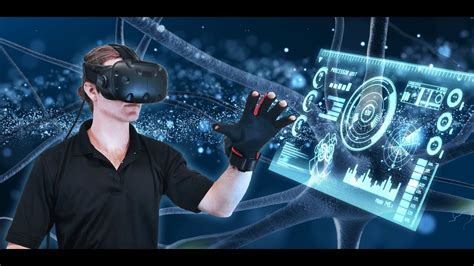In recent years, virtual reality (VR) has transcended the boundaries of cyberspace and emerged as a prominent field with significant real-world applications. As technology continues to advance, the demand for skilled professionals in VR development has soared, prompting American universities to offer specialized programs to meet this need. This blog post will provide an in-depth exploration of virtual reality development programs in American universities, covering various aspects such as the benefits of pursuing VR education, an overview of universities offering VR programs, specialized areas within VR development, program curriculum, faculty expertise, internship opportunities, availability of VR labs and resources, student projects and showcase events, and career prospects for VR graduates. Whether you are considering a career in VR development or seeking insights into the educational landscape of this rapidly evolving field, this post aims to offer valuable information that will guide you in making informed decisions about pursuing VR education in American universities.
Table of Contents
Introduction to Virtual Reality Development
Virtual reality (VR) development is an exciting and rapidly growing field that is revolutionizing the way we experience and interact with technology. With the increasing demand for immersive experiences in various sectors such as gaming, entertainment, education, healthcare, and engineering, the need for skilled VR developers has never been greater.
As technology continues to advance, VR development offers a unique and powerful way to create simulated environments that can be used for training, education, therapy, and entertainment. Whether it’s designing realistic 3D environments, creating interactive experiences, or developing hardware and software for VR devices, the possibilities are endless.
Individuals interested in pursuing a career in VR development can expect to work with cutting-edge technologies such as 3D modeling software, game engines, motion tracking, and haptic feedback devices. The field also requires a strong foundation in computer science, graphic design, and user experience in order to create seamless and immersive VR experiences.
Overall, an introduction to VR development provides an exciting glimpse into the future of technology and the boundless opportunities for innovation and creativity in this rapidly evolving field.
Benefits of Pursuing Virtual Reality in Universities
Virtual Reality (VR) has emerged as a cutting-edge technology with a wide array of applications across various industries. Pursuing a degree in VR from a university can offer numerous benefits to students, both academically and professionally.
One of the key benefits of studying virtual reality in universities is the access to state-of-the-art equipment and resources. Most universities offering VR programs have dedicated labs equipped with high-end VR headsets, motion tracking systems, and development tools. This provides students with the opportunity to gain hands-on experience and practical skills that are essential for a successful career in the field.
Furthermore, pursuing virtual reality in universities allows students to collaborate with experts and faculty members who have extensive experience in the industry. This not only provides valuable mentorship and guidance but also opens up opportunities for networking and professional development.
Additionally, universities often have partnerships and collaborations with industry leaders, providing students with internship opportunities and exposure to real-world VR projects. This can significantly enhance their practical knowledge and make them more competitive in the job market upon graduation.
Overview of American Universities Offering VR Programs
When it comes to pursuing a career in Virtual Reality (VR) development, it is crucial to choose an educational institution that offers a robust program in this field. Thankfully, there are several American universities that provide comprehensive VR programs to equip students with the necessary skills and knowledge.
These programs typically cover a wide range of topics, including 3D modeling, game design, human-computer interaction, and immersive technology. Students will have the opportunity to work with cutting-edge hardware and software, gaining hands-on experience in developing VR applications and simulations.
Furthermore, many of these universities have established partnerships with industry leaders, providing students with valuable internship and collaboration opportunities. This allows students to gain real-world experience and build a network within the VR industry, setting them up for success upon graduation.
Overall, American universities offering VR programs are at the forefront of preparing the next generation of VR developers and designers, providing a solid foundation for a fulfilling career in this rapidly evolving field.
Specializations within Virtual Reality Development
When it comes to pursuing a career in Virtual Reality Development, it’s important to understand the various specializations within this field. From designing immersive environments to creating interactive experiences, there are several paths that aspiring VR developers can explore.
One popular specialization is 3D Modeling and Animation, which involves creating the virtual environments and characters that will be used in VR experiences. This requires a strong understanding of graphic design, as well as proficiency in software such as Maya, 3ds Max, or Blender.
Another important specialization is User Interface/User Experience (UI/UX) Design. This involves creating the interfaces and interactions that users will have within a VR environment. This requires a deep understanding of human-computer interaction and usability principles.
Additionally, there is VR Software Development, which involves creating the code that powers VR experiences. This requires strong programming skills and knowledge of platforms such as Unity or Unreal Engine.
Curriculum of Virtual Reality Development Programs
When pursuing a degree in virtual reality development, students can expect to encounter a diverse and comprehensive curriculum that covers a wide range of topics. The curriculum of virtual reality development programs typically encompasses courses in computer graphics, 3D modeling, animation, game design, human-computer interaction, and programming. These courses provide students with a strong foundation in the technical and creative aspects of virtual reality development.
Additionally, students can also expect to delve into topics such as virtual reality hardware and software, user experience design, immersive storytelling, and the ethical implications of virtual reality technology. The curriculum often includes hands-on projects and practical experience, allowing students to apply their skills in real-world scenarios and gain valuable industry knowledge.
Furthermore, a comprehensive virtual reality development program may offer specialized courses in areas such as augmented reality, virtual reality content creation, interactive media, and advanced programming languages. This allows students to tailor their education to their specific areas of interest and pursue specializations within the field of virtual reality development.
Overall, the curriculum of virtual reality development programs aims to provide students with a well-rounded education that prepares them for the rapidly evolving industry. By combining technical skills, creative innovation, and critical thinking, these programs equip students with the knowledge and expertise needed to succeed in the world of virtual reality.
Faculty and Experts in Virtual Reality Education
When pursuing a degree in virtual reality development, it is important to consider the faculty and experts who will be guiding and mentoring you throughout your education. The expertise and experience of the faculty are crucial in shaping the quality of education and the opportunities available to students.
Many universities offering virtual reality programs have faculty members who are industry leaders with extensive experience in virtual reality development. These experts bring real-world knowledge and insights into the classroom, providing students with a comprehensive understanding of the field.
Students benefit from the mentorship and guidance of these faculty members, as they gain industry-relevant skills and knowledge that can prepare them for successful careers in virtual reality development.
Furthermore, the presence of experts in virtual reality education can open doors to networking and collaboration opportunities with industry professionals, allowing students to stay updated with the latest trends and advancements in the field.
Internship and Industry Collaboration Opportunities
Internship and industry collaboration opportunities are essential components of a comprehensive virtual reality development program. These practical experiences provide students with the opportunity to apply their knowledge and skills in real-world settings, gaining valuable hands-on experience in the field. Through internships, students can work with industry professionals, gaining insights into industry practices and gaining exposure to the latest technologies and trends.
Industry collaboration opportunities also play a crucial role in enhancing the learning experience of virtual reality development students. By partnering with industry leaders, universities can provide students with access to cutting-edge resources, mentorship, and networking opportunities. This collaboration allows students to gain real-world insights and experiences, preparing them for successful careers in the virtual reality industry.
Moreover, internship and industry collaboration opportunities can also lead to potential job offers for students. Many companies use internships as a pipeline for identifying and recruiting top talent, offering full-time positions to interns who demonstrate exceptional skills and potential. This seamless transition from student to professional is a significant advantage for graduates of virtual reality development programs.
In conclusion, internship and industry collaboration opportunities are integral to the success of virtual reality development programs. By providing students with practical experiences, industry insights, and potential job opportunities, these opportunities prepare graduates for successful careers in the dynamic and exciting field of virtual reality.
Availability of Virtual Reality Labs and Resources
When pursuing a degree in Virtual Reality Development, one important factor to consider is the availability of labs and resources. Access to state-of-the-art technology and immersive environments is crucial for students to gain hands-on experience and practical skills. Fortunately, many universities offering VR programs have dedicated labs equipped with the latest VR gadgets, software, and tools.
These labs provide students with the opportunity to experiment, design, and create virtual experiences, preparing them for the demands of the industry. Additionally, universities often have partnerships with VR companies, allowing students to access resources that may not be available elsewhere. This collaboration can provide students with exposure to real-world projects and industry professionals, enhancing their learning experience.
Moreover, the availability of resources such as VR headsets, motion capture systems, and haptic devices enables students to explore diverse applications of VR, from gaming and entertainment to healthcare and education. By having access to these resources, students can tailor their learning to their interests and gain a comprehensive understanding of the field.
Overall, the availability of virtual reality labs and resources plays a crucial role in shaping the educational experience for VR development students, providing them with the tools and opportunities needed to thrive in the dynamic and innovative field of virtual reality.
Student Projects and Showcase Events
Student projects and showcase events in the field of virtual reality development play a crucial role in providing hands-on experience and practical application of knowledge. These events give students the opportunity to showcase their skills and creativity, as well as network with industry professionals and potential employers. Through these projects, students can demonstrate their proficiency in virtual reality development and gain recognition for their innovations and contributions to the field.
Participating in showcase events also allows students to receive valuable feedback from industry experts and peers, providing them with insights to improve their projects and expand their knowledge base. These events serve as a platform for students to gain visibility and build a reputation within the virtual reality community, ultimately increasing their chances of securing internships and job opportunities post-graduation.
Moreover, showcasing their projects in such events fosters a sense of pride and accomplishment among students, as they witness the impact of their work on the audience and the industry at large. It also serves as an incentive for students to continually enhance their skills and push the boundaries of innovation in virtual reality development, contributing to the overall advancement of the field.
In conclusion, student projects and showcase events are integral components of virtual reality education, offering students a platform to display their talents, gain recognition, and receive valuable feedback. These events not only contribute to the students’ personal and professional growth but also bolster the overall development and innovation within the virtual reality industry.
Career Prospects for Virtual Reality Graduates
Graduating with a degree in virtual reality opens up a world of exciting career opportunities in an ever-evolving industry. As technology continues to advance, the demand for skilled professionals in virtual reality development is on the rise, presenting graduates with a multitude of potential career paths.
With expertise in virtual reality programming and design, graduates can explore roles in various fields such as gaming development, film and entertainment, healthcare simulation, and architectural visualization. The versatile nature of virtual reality technology allows for diverse career options, catering to different interests and specializations within the industry.
Additionally, virtual reality graduates may find opportunities in research and development, pushing the boundaries of immersive experiences and virtual environments. Companies specializing in virtual reality hardware and software are constantly seeking skilled professionals to drive innovation and create cutting-edge solutions for various industries.
Furthermore, the growth of augmented reality and mixed reality technologies further expands the career prospects for virtual reality graduates, offering roles in fields such as education, training and development, and simulated environments for enterprise applications.





